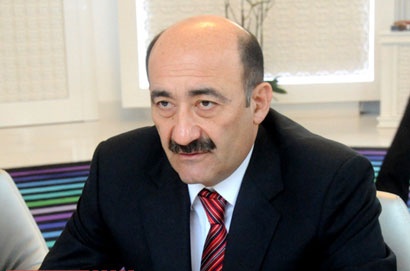Baku concerned over delay of sending fact-finding mission to occupied territories

By Aynur Jafarova
Baku has expressed concern over the artificial delay of sending the fact-finding mission of the international organizations to Azerbaijan's occupied territories where the historical and cultural monuments are being destructed as a result of the Armenian occupation.
Azerbaijani Culture and Tourism Minister Abulfaz Garayev told Trend Agency on September 2 that all international organizations, to which Azerbaijan has appealed, failed to establish a fact finding commission.
"The issue of destruction of the cultural and religious monuments in the occupied territories of Azerbaijan and acts of vandalism against them were repeatedly discussed in the international arenas" he noted. "Each time, the international organizations consider this issue, they show respect for the Azerbaijani position. However, today these organizations are using a "balanced" approach."
Garayev also said the proposals voiced by Azerbaijan and Armenia differ and that is why, sending a fact-finding missions to the region on the part of UNESCO, the Council of Europe and other organizations, determining facts about destruction of historical and cultural monuments in the occupied territories and other similar initiatives have always encountered resistance from the opposite side.
"Azerbaijan stressed that it is open to such investigations," he said. "All historical and cultural monuments in the country are under its protection. Destructing any of them, regardless of the religion, history and culture is unacceptable."
Azerbaijan and Armenia fought a lengthy war that ended with the signing of a precarious cease-fire in 1994. Since then, Armenian armed forces have occupied over 20 percent of Azerbaijan's internationally recognized territory, including Nagorno-Karabakh, defying international calls and UN resolutions.
After invading Azerbaijan's territories, Armenia has been pursuing the campaign of ruining cultural and historical monuments of Azerbaijani people. The Armenians are fabricating facts about the monuments of the ancient Caucasus Albania. A variety of ancient Albanian scripts, wall designs and crosses have been replaced by Armenian attributes. A number of mosques are used as store-houses. Buildings as well as unique exhibits of the museums located in the occupied Azerbaijani lands have been either destroyed or used as a basis for new museums, with Armenians claiming that they belong to them.
The first human dwellings like the well-known Azykh and Taghlar caves, the Garakopak and Uzarliktapa burial mounds, located in the occupied territories, are being used for military purposes. Most of them have been destroyed. Cemeteries, mausoleums, monuments, mosques, temples and monuments that once belonged to Caucasus Albania and other cultural heritage sites in the occupied regions of Shusha, Lachin, Kalbajar, Gubadli, Zangilan, and Fuzuli have been destroyed along with burial mounds in Khojaly, Aghdam, Aghdara, Fuzuli and Jabrayil.
The destruction of Azerbaijani cultural monuments in the occupied territories continues to this day. The invaders are carrying out large-scale archeological excavations, destroying burial mounds. Remaining in the Azerbaijani territories occupied by Armenia -- Nagorno-Karabakh and the surrounding regions -- are 13 architectural and archeological monuments of global importance, 292 monuments of state importance and 330 of local importance, as well as 23 parks, and 15 decorative art samples.
Total damage inflicted to Azerbaijan amounts to $6.7 billion, according to approximate calculations based on the documents of 1994. The figure excludes items of intangible heritage, and it is impossible to determine the immense moral value of these destroyed, ancient and irreplaceable cultural monuments of the Azerbaijan people.
Preservation of historical and cultural monuments in the Armenia-occupied territory of Azerbaijan as memories of the nation's centuries-old history is a matter of international importance, because Azerbaijani people's cultural heritage is an integral part of the world culture.
The destruction and damaging of the historical and cultural monuments by the Armenian invaders in the occupied territories of Azerbaijan contradict the 1954 Hague convention on preservation of cultural values during armed conflicts, the 1992 European convention on preservation of archeological heritage, and the 1972 UNESCO convention on preservation of world cultural and natural heritage.
